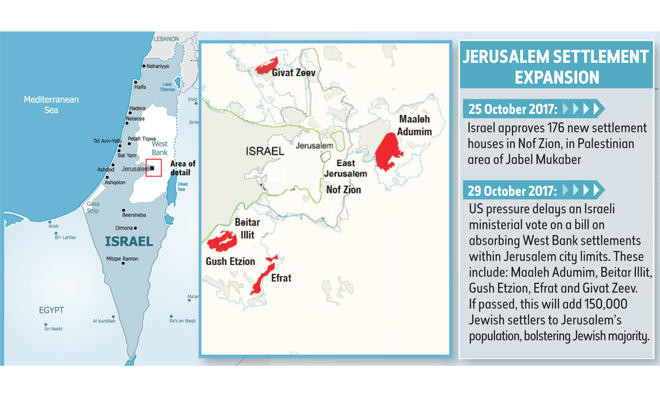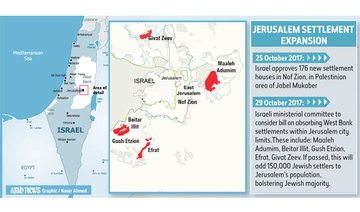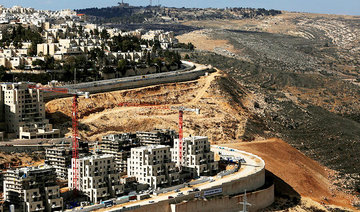JERUSALEM: Under pressure from the US, Israel has delayed a bill that would connect a number of West Bank settlements to Jerusalem, officials said Sunday.
The bill aims to solidify the city’s Jewish majority, but stops short of formal annexation, making the practical implications unclear. The bill says the communities would be considered “daughter municipalities” of Jerusalem.
The Palestinians claim both East Jerusalem and the West Bank, territories captured by Israel in the 1967 war, as part of their future state, a position that has wide international backing. Israel annexed East Jerusalem in a move not recognized internationally.
Israel’s Haaretz newspaper quoted Netanyahu as saying Israel needs to coordinate the bill with the US.
“The Americans turned to us and inquired what the bill was about. As we have been coordinating with them until now, it is worth (to continue) talking and coordinating with them. We are working to promote and develop the settlement enterprise,” it quoted Netanyahu as saying at a government meeting Sunday.
Earlier Sunday, David Bitan, the Likud party’s parliamentary whip and a close Netanyahu ally, told Army Radio the vote was delayed because “there is American pressure claiming this is annexation.”
Peace Now, an Israeli anti-settlement watchdog group, said the bill would amount to “de facto annexation” and be a clear step toward full annexation of the West Bank.
US President Donald Trump’s envoy Jason Greenblatt has been shuttling throughout the region in hopes of restarting peace talks, which last collapsed in 2014.
But in contrast to the Obama administration, Trump has not explicitly endorsed a Palestinian state. He also has shown some tolerance for settlement construction, urging Israel to show restraint but saying a complete halt is unnecessary.
Israel says the fate of the settlements, home to more than 600,000 Israelis, should be decided through peace talks along with other core issues like security.
Also on Sunday, Israeli Defense Minister Avigdor Lieberman he wants to expand the controversial policy of demolishing homes of Palestinians involved in fatal attacks to include perpetrators who seriously wound Israelis.
The minister has instructed the army and Defense Ministry to “examine the possibility to demolish the homes of terrorists who carried out attacks in which Israeli civilians were seriously wounded,” Lieberman said in a statement.
“Destroying the homes of terrorists who carried out murderous attacks is an effective and proven means in the fight against terror and deters those planning attacks,” the statement said.
Israel says the demolition policy, in place since 1967, is a means of deterring future attackers.
Critics of the policy say it is a form of collective punishment, forcing family members to suffer for the acts of relatives, and illegal under international law.
They also question whether the policy acts as a deterrent or if it creates more potential attackers due to the anger it provokes.
Under US pressure, Israel delays move to expand Jerusalem
Under US pressure, Israel delays move to expand Jerusalem

Why Trump proposal on Palestinian displacement from Gaza rings alarm bells in the region

- Many Palestinians in Gaza have said they would not leave the enclave even if they could because they fear it might lead to another permanent displacement in a repeat of 1948
WASHINGTON: US President Donald Trump’s suggestion that Jordan and Egypt should take more Palestinians from Gaza, shattered by 15 months of war, is seen raising concerns among the enclave’s inhabitants as well as its neighbors. The proposal is likely to heighten fears among Palestinians in Gaza, which had a pre-war population of around 2.3 million, of being driven out of the coastal strip, and stoke concern in Arab states that have long worried about the destabilising impact of any such exodus.
WHAT IS BEHIND THE CONCERNS?
Palestinians have long been haunted by what they call the “Nakba,” or catastrophe, when 700,000 of them were dispossessed from their homes during the war that surrounded the creation of Israel in 1948.
Many were driven out or fled to neighboring Arab states, including to Jordan, Syria and Lebanon, where many of them and their descendants still live in refugee camps. Some went to Gaza. Israel disputes the account that they were forced out. The latest conflict, currently paused amid a fragile ceasefire agreement, has seen an unprecedented Israeli bombardment and land offensive in Gaza, devastating urban areas.
Most Gazans have been displaced several times during Israel’s offensive, launched after Hamas’ Oct. 7, 2023 attack on Israel that killed 1,200 people, according to Israeli tallies.
More than 47,000 people have been killed in Gaza since then, according to Palestinian health officials.
HOW HAVE PALESTINIANS MOVED DURING THIS CONFLICT?
Before Israel launched its offensive in 2023, it told Palestinians in north Gaza to move to what it said were safe areas in the south. As the offensive expanded, Israel told them to head further south toward Rafah.
Later in the war, before launching a campaign in Rafah, it instructed them to move to a new designated humanitarian zone in Al-Mawasi, an area that stretches 12 km (7 miles) along the coast, starting from the western areas of Deir Al-Balah in central Gaza to Khan Younis and Rafah in the south.
According to UN estimates, up to 85 percent of the population of Gaza — one of the world’s most densely populated areas — have already been displaced from their homes.
COULD A MAJOR DISPLACEMENT FROM GAZA HAPPEN?
Many Palestinians in Gaza have said they would not leave the enclave even if they could because they fear it might lead to another permanent displacement in a repeat of 1948.
Egypt, meanwhile, has kept the border firmly closed except to let a few thousand foreigners, dual nationals and a handful of others leave Gaza.
Egypt and other Arab nations strongly oppose any attempt to push Palestinians over the border. Yet, the scale of this conflict eclipses other Gaza crises or flare-ups in past decades, as does the humanitarian disaster for Palestinians.
From the earliest days of the conflict, Arab governments, particularly Egypt and Jordan, said Palestinians must not be driven from land where they want to make a future state, which would include the occupied West Bank and Gaza. Like Palestinians, they fear any mass movement across the border would further undermine prospects for a “two-state solution” — the idea of creating a state of Palestine next to Israel — and leave Arab nations dealing with the consequences.
WHAT HAVE ISRAEL’S GOVERNMENT AND ITS POLITICIANS SAID?
Israel’s then-Foreign Minister Israel Katz, now serving as defense minister, said on Feb. 16, 2024, that Israel had no plans to deport Palestinians from Gaza. Israel would coordinate with Egypt on Palestinian refugees and find a way to not harm Egypt’s interests, Katz added.
However, comments by some in the Israeli government have stoked Palestinian and Arab fears of a new Nakba. Finance Minister Bezalel Smotrich has repeatedly called for a policy of “encourging the migration” of Palestinians from Gaza and for Israel to impose military rule in the territory.
US condemns capture of UN staff by Houthis

- The Houthi militia has detained dozens of staff from UN and other humanitarian organizations, most since the middle of last year
The US State Department has condemned the capture of additional UN staff by Houthi rebels in Yemen, amid the group’s ongoing attacks in the region.
In a statement, the department called for the release of all detainees, including seven UN workers captured on Thursday, and decried the “campaign of terror” by the rebel group.
“This latest Houthi roundup demonstrates the bad faith of the terrorist group’s claims to seek de-escalation and also makes a mockery of their claims to represent the interests of the Yemeni people,” the State Department said.
It also highlighted an executive order signed by President Donald Trump this week placing the Houthis back on the US list of foreign terrorist organizations.
The Houthi militia has detained dozens of staff from UN and other humanitarian organizations, most since the middle of last year.
UN Secretary-General Antonio Guterres has called for the “immediate and unconditional” release of all aid staff held in Yemen, where an ongoing humanitarian crisis has left the country reeling after a decade of war.
The Houthis, saying they are acting in solidarity with the Palestinians, have been attacking the Red Sea shipping route and firing on Israel since the outbreak of the Gaza war, prompting reprisal strikes from US, Israeli and British forces.
On Saturday, Houthi rebels unilaterally freed 153 war detainees, the International Committee of the Red Cross said.
Previous prisoner releases have been viewed as a means to jump-start talks over permanently ending Yemen’s decadelong war.
Those previously released had been visited by Red Cross staff in Sanaa and received medical checks and other assistance, the organization said while announcing the release.
Turkiye FM calls for regional cooperation to fight PKK

- Two Iraqi border guards were killed Friday near the Turkish border in a shooting that Iraq blamed on the PKK
BAGHDAD: Turkish Foreign Minister Hakan Fidan called for combined regional efforts to combat outlawed Kurdish fighters in Iraq and neighboring Syria during a visit to Baghdad on Sunday.
The Kurdistan Workers’ Party, also known as PKK, which has fought a decades-long insurgency against the Turkish state, holds positions in Iraq’s autonomous Kurdistan region, which also hosts Turkish military bases.
The PKK is listed as a terrorist organization by Turkiye and its Western allies, and Ankara accuses Kurdish forces in Syria of links to the outlawed group.
“I want to emphasize this fact in the strongest way: The PKK is targeting Turkiye, Iraq and Syria,” Fidan said in a press conference with his Iraqi counterpart Fuad Hussein.
“We must combine all our resources and destroy both Daesh and the PKK,” he added.
Fidan’s visit comes after two Iraqi border guards were killed Friday near the Turkish border in a shooting that Baghdad blamed on the PKK. After the attack, Ankara vowed to work with Iraq to secure their common frontier.
Turkiye regularly launches strikes against the PKK in Iraq and Kurdish fighters in Syria.
Baghdad has recently sharpened its tone against the PKK, and last year it quietly listed the group as a “banned organization” — though Ankara demands the Iraqi government do more in the fight against the militant group.
“Our ultimate expectation from Iraq is that it recognizes the PKK, which it has declared a banned organization, as a terrorist organization as well,” Fidan said.
In August, Baghdad and Ankara signed a military cooperation deal to establish joint command and training centers with the aim of fighting the PKK.
The foreign ministers also discussed the fight against Daesh on the Iraqi-Syrian border, Hussein said during the press conference, as well as the situation in Syria, where former leader Bashar Assad was toppled in December.
“There are clear understandings between ... Turkiye and Iraq on how to address” the situation there, he said, adding that Baghdad was in contact with the new Syrian authorities and was “trying to coordinate on many issues.”
Earlier this month, Fidan threatened to launch a military operation against Kurdish forces in Syria, where Turkiye has carried out successive ground operations to push the fighters away from its border.
The Kurdish forces there are seen by the West as essential in the fight against Daesh.
Palestinian president condemns ‘any projects’ to displace Gazans

- Trump said on Saturday that he wanted Jordan and Egypt to take Palestinians from Gaza, suggesting “we just clean out that whole thing”
RAMALLAH: Palestinian president Mahmud Abbas condemned on Sunday “any projects” to relocate the people of Gaza outside the territory, after US President Donald Trump suggested moving them to Egypt and Jordan.
Without naming the US leader, Abbas “expressed strong rejection and condemnation of any projects aimed at displacing our people from the Gaza Strip,” a statement from his office said, adding that the Palestinian people “will not abandon their land and holy sites.”
Trump, less than a week into his second term as president, said on Saturday that he wanted Jordan and Egypt to take Palestinians from Gaza, suggesting “we just clean out that whole thing.”
The idea was swiftly rejected by Jordan, while Egypt has previously spoken out against any suggestions that Gazans could be moved there.
In the statement issued by the Palestinian presidency, based in the Israeli-occupied West Bank, Abbas said: “We will not allow the repetition of the catastrophes that befell our people in 1948 and 1967.”
The former is known to Palestinians as the Nakba, or “catastrophe,” when hundreds of thousands were displaced during the war the coincided with Israel’s establishment.
The 1967 Arab-Israeli war, during which Israel conquered Gaza and the West Bank, is known as the Naksa, or “setback,” and saw several hundred thousand more displaced from those territories.
Abbas also rejected what he called “any policy that undermines the unity of the Palestinian land in the Gaza Strip and the West Bank, including east Jerusalem.”
He called on Trump to “continue his efforts to support” the ceasefire in Gaza that began on January 19 and said the Palestinian Authority remained ready to take on the governance of the war-battered territory.
Palestinian sources say to free Gaza hostage demanded by Israel before next swap

- Arbel Yehud will be handed over within days, sources say
- In exchange, 30 prisoners serving life sentences will be released
CAIRO: Two Palestinian sources told AFP on Sunday that an Israeli woman held hostage in Gaza, and whose release Israel has demanded before allowing the return of displaced Palestinians, will be handed over within days.
“Arbel Yehud is expected to be freed before the next (hostage-prisoner) exchange” scheduled for February 1, said a source from the Islamic Jihad militant group.
Another Palestinian source familiar with the issue said Yehud is expected to be released by Friday.
“The release of Arbel Yehud will happen most likely by next Friday in exchange for 30 prisoners serving life sentences,” the source said on condition of anonymity as he was not authorized to speak on the matter publicly.
Israel has accused Hamas of reneging on the ceasefire deal by not releasing Yehud when the second hostage-prisoner took place on Saturday.
As a civilian woman, Yehud “was supposed to be released” as part of the second hostage-prisoner swap under the truce deal, a statement from the office of Prime Minister Benjamin Netanyahu said.
Labelling it a violation by Hamas of the ceasefire deal, Netanyahu’s office said it “will not allow the passage of Gazans to the northern part of the Gaza Strip until the release of civilian Arbel Yehud... is arranged.”
On Saturday, two Hamas sources told AFP that Yehud was “alive and in good health,” with one source saying she would be “released as part of the third swap set for next Saturday.”
But on Sunday, the two Palestinian sources said she was expected to be released following an intervention by mediators Egypt and Qatar.
“The crisis has been resolved,” said the source familiar with the issue.
Tens of thousands of displaced Gazans massed on Sunday on the road to the north but were not allowed to pass through, AFP correspondents reported.





















